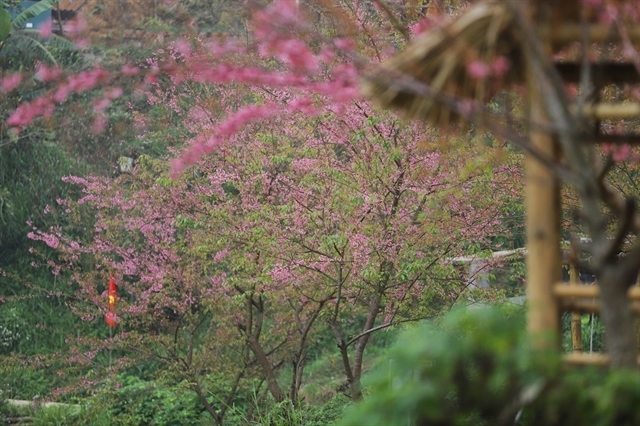 Features
Features

Using scissors as brushes and fabric as a palette, artist Trần Thanh Thục meticulously depicts the poetic landscapes of Việt Nam and her love for the capital city of Hà Nội
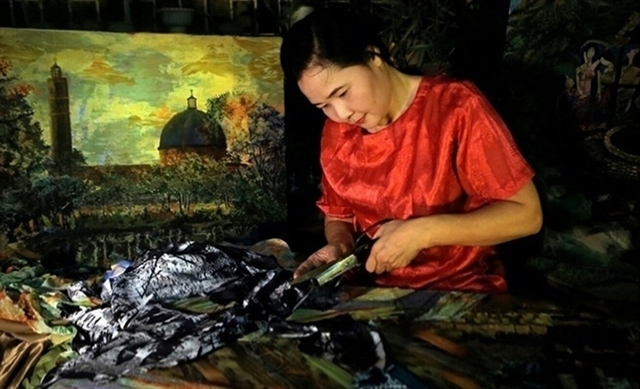
|
| Trần Thanh Thục is the only artist in Việt Nam creating large landscape pictures from fabric patterns. Photo courtesy of the artist |
By Lương Thu Hương
Using scissors as brushes and fabric as a palette, artist Trần Thanh Thục meticulously depicts the poetic landscapes of Việt Nam and her love for the capital city of Hà Nội, in her artworks.
The 62-year-old has been persistently pursuing her own artistic path for 40 years, and has established a reputation as the only artist in Việt Nam creating large-scale landscape pictures from fabrics, being displayed at many exhibitions.
Unlike other materials like oil or gouache paintings, these are created from layers of fabric and have unexpected effects in both colour and layout. Each of Thục’s artworks has been highly appraised and valued for not only its sophisticated materials and creative ideas, but the hours of dedication she puts into each of her pictures.
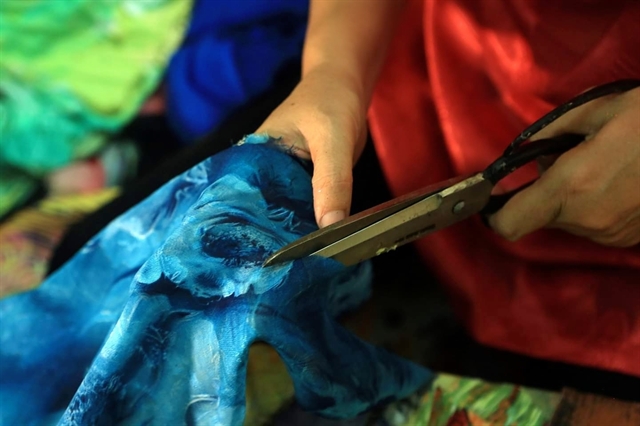
|
| Scissors and fabric are indispensable to her work. Photo courtesy of the artist |
Thục discovered that fabric could also be used as a material for art by chance during a visit to her hometown in the northern province of Nam Định.
Seeing pieces of cloth at a friend's house, she tried using scissors to cut out cloth patterns then assembled them into a scene of a poetic village in northern Việt Nam.
Delighted with the unexpected effects and encouraged by her father who is also knowledgeable about art, Thục started to collect scraps of patterned cloth as material for her first artworks.
Her first fabric pictures were completed in the 1980s when she was a student at the Việt Nam University of Fine Arts.
However, her path to pursue the art form was challenging. Since her husband passed away when she was just 32, she had to take up regular work to raise her small daughter and could only pursue her artistic passion at night.
Thục’s process of creating the first pictures was full of trial and error as she had to study everything herself. Additionally, fabric, particularly with patterns, was in shortage during the economically difficult period in the 1980s.
To accumulate material, she had to frequently visit tailors to ask for or buy bags of discarded cloth, which was often mixed with rubbish.
The artist could only be thoroughly devoted to her art when she retired. As soon as life became better and the sources of material more abundant, the first places she visited were cloth markets and áo dài (traditional dress) shops nationwide, often in mountains areas like Hà Giang or as far away as Huế and Hội An.
Her collection of fabric has also been enriched with delicate silk scarves sent by her friends abroad.
The results of her 40-year-old collecting cloth are seen in her studio on the second floor of her small house tucked away in a quiet alley on Kim Mã Street. A 15-square-metre room is filled with fabric on the floor, hung on a line or stored in bags in the corners.
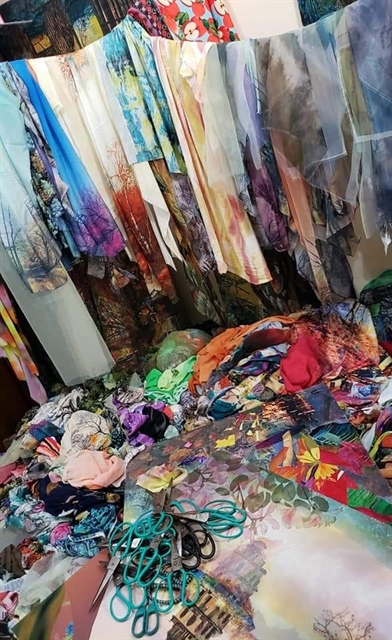
|
| Thục's studio is full of cloth. Photo courtesy of the artist |
No fans or air conditioners are allowed in the stuffy room, even in summer, in order to not mess up the small fabric pieces.
“The sources of details for fabric pictures are scarce. Sometimes a large piece of cloth provides just a small detail. For the choice of fabric, I also must be very picky as it must be fine fabric or those used to tailor áo dài. Ordinary types cannot be used," she told Việt Nam News.
“The process of creating a complete work is an arduous period of constant puzzle solving, of finding the appropriate details among the cloth and calculating its colours and layouts. I might be occupied with the ideas for my picture even when I do other work, and normally spent eight to ten hours per day on it.”
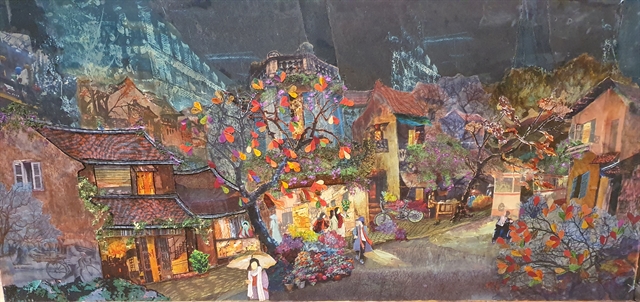
|
| Những Ô Cửa Hình Ánh Sáng (Light-Shaped Windows) by Trần Thanh Thục. |
It was not until 2000 that Thục’s artworks became known to the art community and introduced to the markets. They have been favoured and purchased by not only domestic art enthusiasts but also collectors from abroad, such as Singapore, Sweden or Australia. Due to its sophistication, the price of each fabric painting ranges from US$1,000-5,000.
The artist had her first solo exhibition, Nhịp Xuân 1, in Hà Nội in 2015, which marked her achievement in her journey pursuing fabric arts. The displayed works were well received by the public and inspired her creatively.
Since 2015, Thục has collaborated with other artists in many joint exhibitions, like Vải Và Giấy Dó (Cloth and Poonah Paper) with painter Lê Tuấn Anh in 20016, or Vải Và Thép (Cloth and Steel) with sculptor Lê Thị Hiền last year.
Endless love for Hà Nội
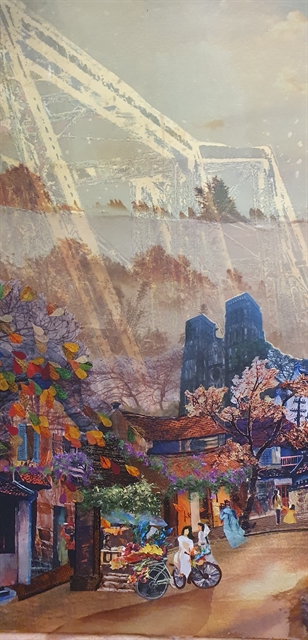
|
| Hà Nội in the old days has inspired Thục's artworks. VNS Photo Lương Thu Hương |
Thục’s artworks depict the beautiful natural landscape of Việt Nam such as the scenery of the Nho Quế River in Hà Giang Province or the tranquil scenery of a Vietnamese village, but her greatest inspiration is Hà Nội.
Born in Nam Định Province but studying, living, and working in Hà Nội from a young age, the artist holds a special affection for the city, particularly how it was in the past.
Many of her typical paintings are inspired by the thousand-year-old capital city such as Ô Quan Chưởng (The Quan Chưởng Gate), Chiều trên đường Cổ Ngư (An Afternoon on Cổ Ngư Road) or Êm Đềm Phố Cổ (Tranquil Old Town).
Iconic landmarks of the city such as Long Biên Bridge, Hà Nội Opera House, St Joseph’s Cathedral, and Hoàn Kiếm Lake are vividly portrayed through layers of fabric.
Original features of Hà Nội are also demonstrated in Thục’s paintings, like the French-style architectural buildings, moss-covered tile roofs, the old yellow walls or the bright colours of the leaves of almond trees.
“Little by little I work. Today I build a house, tomorrow I build its tile roof and then I plant a tree the following day. I sit carefully to pick the colours of each almond leaf flying across the streets, sunlight lingering on the pavements, a bicycle temporarily leaning against the wall or a cyclo driver wiping away his sweat," she said.
"That’s my Hà Nội. I could cut to the scene of a long street. I want to go back to the corner where my favourite coffee shop is located. I want to speak out for all the things I love and the memories that I want to show.”
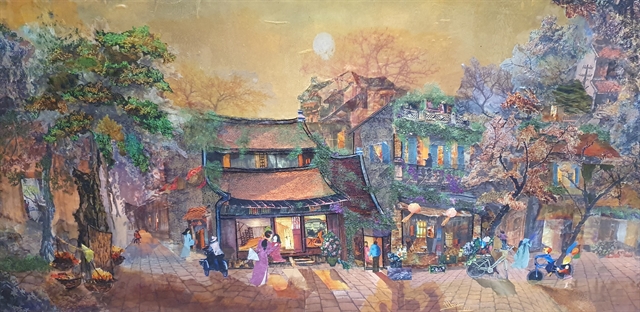
|
| Nhịp Sống Phố Cổ (The Old Quarter Living). |
The artist is preparing for her next solo exhibition Nhịp Xuân 2, featuring 30 Hà Nội-inspired artworks, at the Exhibition Hall of Việt Nam Fine Arts Association on Ngô Quyền Street. The exhibition is a gift from the artist to the city where she has had so many memories and for which she holds so much love. VNS




